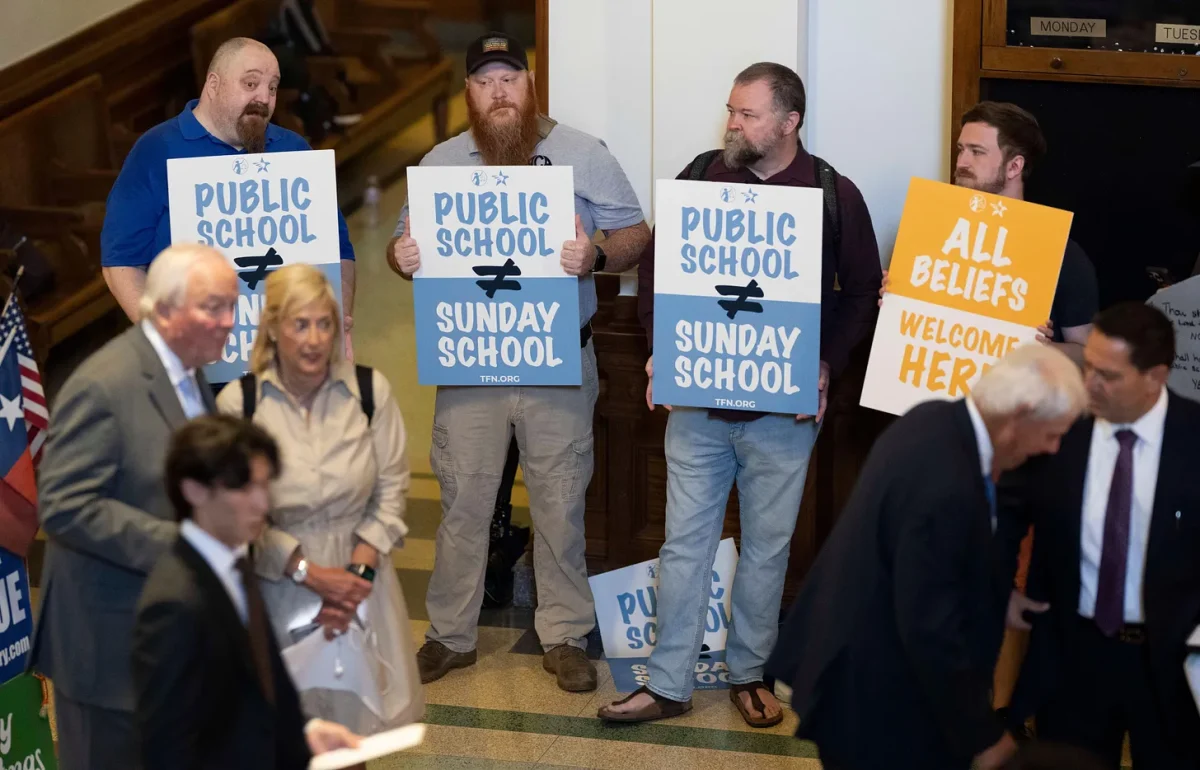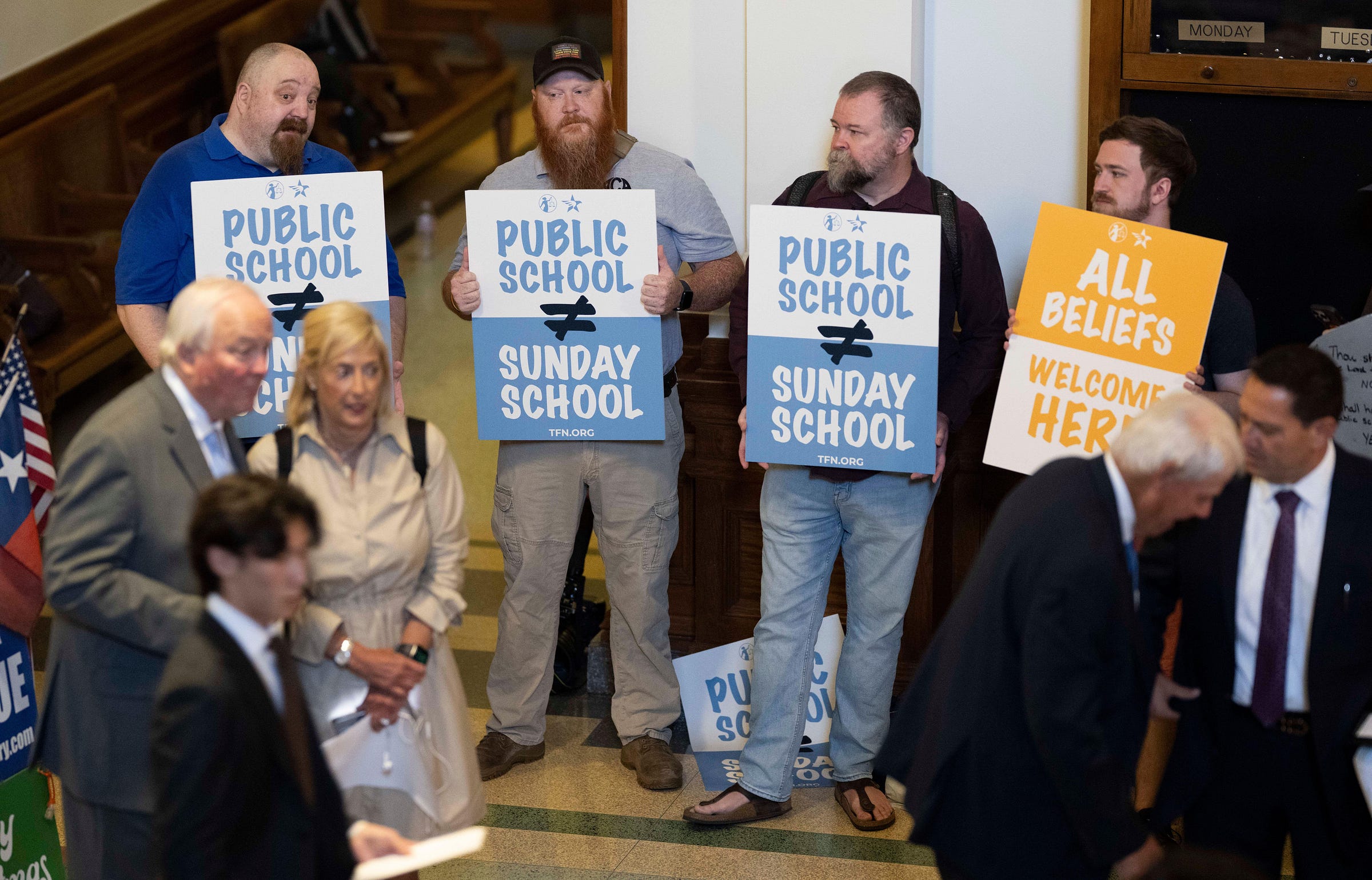
It’s the time of year that dashes summer fun for children, brings a sigh of relief from parents (especially those who work at home), and sparks a run on the supply aisle at Walmart. As another school year starts in many communities across the nation, this is a good time to remember that public education is a primary area where we’re seeing Christian Nationalism pushed.
Just yesterday (Aug. 20), U.S. District Court Judge Fred Biery declared in a ruling that a new Texas law requiring public schools to post a highly edited version of the Ten Commandments likely violates both the Establishment and Free Exercise Clauses of the First Amendment. Biery, a graduate of Texas Lutheran College and Southern Methodist University, thus issued an injunction blocking the defendant school districts from putting up the displays.
“The displays are likely to interfere with and usurp the fundamental rights of the parent-Plaintiffs,” Biery wrote. “The displays are likely to send an exclusionary and spiritually burdensome message to the child-Plaintiffs who do not subscribe to the approved version of the Ten Commandments … Moreover, the displays are likely to pressure the child-Plaintiffs into religious observance, meditation on, veneration, and adoption of the State’s favored religious scripture, and into suppressing expression of their own religious or nonreligious background and beliefs while at school.”

Protesters position themselves just outside the entrance to the Texas House of Representatives chamber in Austin on May 21, 2025, before lawmakers voted on a bill to require every public school classroom to display a highly edited version of the Ten Commandments. (Bob Daemmrich/Alamy)
The Texas ruling mirrors injunctions in Louisiana and Arkansas that passed similar laws. Because the ruling came at the start of the school year, many schools had already hung up the posters with the state’s rewritten version of the Ten Commandments. A district in Frisco spent $1,800 on the posters. Meanwhile, rightwing pundit Glenn Beck and other activists have donated more than 145,000 posters to Texas schools — even though the alleged “Ten Commandments” text on the posters cannot be found in any actual Bible since lawmakers gerrymandered the Ten Commandments.
While I celebrate that legal good news, it’s alarming that we’re seeing such legislation being pushed across the country along with other ways to codify a narrow version of Christianity in public schools. Even more concerning, some of the legislative ideas enjoy public support. So this issue of A Public Witness looks at the need for those who oppose Christian Nationalism to fight not just with lawsuits but also in the court of public opinion so we can protect the religious liberty rights of students, their parents, and their houses of worship.

Red Flags
Ever since the 1963 Supreme Court decision in Engle v. Vitale, some Christians have complained that the justices banned prayer in public schools. But that didn’t happen. The justices simply don’t have that power. As James Dunn, a longtime leader of the Baptist Joint Committee for Religious Liberty, liked to quip, “As long as there are math tests, there will be prayer in schools.” Nor did the justices, as some like to claim, kick God out of public schools. That would be a pretty puny god to be ordered out of a building by nine people in black robes.
What the justices instead did in that landmark case was to declare it unconstitutional for a state to write a prayer and require students to pray it. That is, the justices barred coercive government prayer. As Beau Underwood and I documented in Baptizing America, mainline Protestant leaders wrote and heralded the prayer that led to the Engel v. Vitale case. In more recent decades, evangelicals have adopted the mission to return government prayer to classrooms as their own crusade. It’s such a significant part of a Christian Nationalist ideology that sociologists often include a question about supporting such legislation in surveys gauging support for Christian Nationalism. Unfortunately, it’s an idea many Americans like.
Pew Research Center found that just over half of Americans support “allowing public school teachers to lead their classes in prayers that refer to Jesus.” While 52% support it — including 27% saying they “strongly support” the idea — 46% of Americans oppose it.

The rest of this piece is only available to paid subscribers of the Word&Way newsletter A Public Witness. Subscribe today to read this essay and all previous issues and receive future ones in your inbox.






